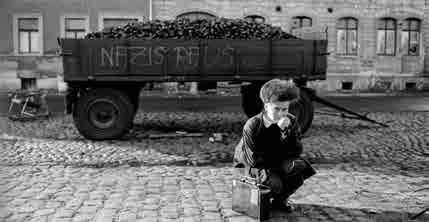
28 minute read
BLEIBT ALLES ANDERS?
KATALOG FESTIVAL BLEIBT ALLES ANDERS? BLEIBT ALLES ANDERS? BLEIBT ALLES ANDERS? BLEIBT ALLES ANDERS? BLEIBT ALLES ANDERS? BLEIBT ALLES ANDERS? BLEIBT ALLES ANDERS? BLEIBT ALLES ANDERS?
BLEIBT ALLES ANDERS? wird gefördert von der Bundesstiftung zur Aufarbeitung der SED-Diktatur. EVERYTHING STAYS DIFFERENT? is supported by the Federal Foundation for the Reappraisal of the SED Dictatorship.
Advertisement
BLEIBT ALLES ANDERS? eine Filmreihe zur „Wende- und Nachwendezeit“ 30 Jahre nach dem Mauerfall sind die Diskussionen über die Entwicklungen 1989/90 und der „Nachwendezeit“ in Deutschland so lebendig wie nie. Im gesellschaftlichen Diskurs stehen Bilder von Freiheit und neuer Selbstbestimmung denen von sozialen Verwerfungen und einer mutmaßlichen Kolonialisierung des Ostens durch den Westen gegenüber. Und vor dem Hintergrund von Globalisierung und Migrationsdebatten stellen die Erfolge rechtspopulistischer Parteien und ein allgemeines Protestverhalten, gerade in Ostdeutschland, eine immer größere Herausforderung für die liberale Demokratie dar. Inwiefern haben die teilweise bis heute fortdauernden Transformationsprozesse die Weichen für die Gegenwart und vielleicht auch für die Zukunft gestellt? Wie lassen sich die Zusammenhänge mit den gegenwärtigen gesellschaftlichen Konflikten verstehen? Und wie können diese Konflikte vielleicht auch genutzt werden, um zu einem größeren gegenseitigen Verständnis und zu einer konstruktiven Gestaltung der Gesellschaft beizutragen? Die Reihe Bleibt alles anders? zeigt unterschiedliche Perspektiven sozialer, kultureller und ganz persönlicher Entwicklungen in insgesamt 12 Spiel- und Dokumentarfilmen – von denen der Großteil beim FFC präsentiert wird –, die zwischen 1990 und 2019 produziert wurden: mit Zeitdokumenten, die die Prozesse unmittelbar beobachten; Regisseuren und Regisseurinnen, die diese rückblickend reflektieren; mit Perspektiven aus Ost und West und mit einem filmischen Ausflug zu den Nachbarn der ehemaligen Tschechoslowakei und ihrem Blick auf die Neunziger. Bleibt alles anders? erzählt die Geschichten von Menschen – nicht nur – aus Ostdeutschland und ergründet Identitätsfragen, die heute wieder neu verhandelt werden. Wo stehen wir zwischen Aufbruchsstimmung und persönlichen Brüchen, zwischen eigener Sozialisierung und gesamtgesellschaftlichen Narrativen, zwischen Ost und West, zwischen geteilter Geschichte und gemeinsamer Zukunft? CR Die Filme der Reihe Bleibt alles anders? werden an verschiedenen Orten präsentiert: Hauptsächlich in Cottbus während des Filmfestivals, vorab an mehreren Terminen aber auch in Wiesbaden im Rahmen des goEast – Filmfestival des mittel- und osteuropäischen Films (www.filmfestival-goeast.de/de/) sowie im Menschenrechtszentrum Cottbus (www.menschenrechtszentrum-cottbus.de/). Darüber hinaus: - in Dresden in der JohannS tadthalle (www.johannstadthalle.de) ALLES ANDERE ZEIGT DIE ZEIT | Andreas Voigt, DE 2015, 94 MIN ZONENMÄDCHEN | Sabine Michel, DE 2013, 75 MIN - während der Osteuropäischen Filmtage Dresden im Kino in der Fabrik (www.kinofabrik-dresden.de) DĚDICTVÍ ANEB KURVAHOŠIGUTNTÁG | Věra Chytilová, ČSSR 1992, 120 MIN - im Rahmen von „Goodbye Socialism, Hello Capitalism“ im Ostentor-Kino Regensburg (www.ostentorkino.de/reihe/S17/ Images_of_Revolution) MEČIAR | Tereza Nvotová, SK/CZ 2017, 89 MIN - im LWL-Industriemuseum Henrichshütte in Hattingen (www.lwl.org/industriemuseum/standorte/henrichshuette-hattingen) FORTSCHRITT IM TAL DER AHNUNGSLOSEN | Florian Kunert, DE 2019, 67 MIN - im atelier automatique in Bochum (https://atelierautomatique.de) ALLES ANDERE ZEIGT DIE ZEIT | Andreas Voigt, DE 2015, 94 MIN ZONENMÄDCHEN | Sabine Michel, DE 2013, 75 MIN EVERYTHING STAYS DIFFERENT? A film series on the unification period and its aftermath Thirty years after the fall of the Berlin Wall discussions about the events of 1989/90 and the post-reunification era in Germany are more lively than ever. In public discourse images of freedom and a newfound autonomy contrast with those of social upheaval and a supposed colonisation of the East by the West. Against a background of globalisation and debates on migration the successes of right-wing populist parties and a general mood of protest, especially in eastern Germany, represent an ever greater challenge to liberal democracy. To what extent have the processes of transition, some of which continue to this day, set the course for the present and perhaps also for the future? How can interrelations between the past and current social conflicts be understood? And how might these conflicts be used to generate greater mutual understanding and a constructive shaping of society? The series Will all remain different? presents different perspectives on social, cultural and personal developments across a total of twelve feature and documentary films, most of which are presented at this year’s FFC, produced between the years 1990 and 2019: complete with contemporary documents which bore witness to the processes in question; directors who take a retrospective look thereupon; with perspectives from East and West and with a cinematic exploration of the one-time neighbours of the former Czechoslovakia and their respective takes on the nineties. Will all remain different? tells the stories of people from eastern Germany and beyond whilst exploring identity issues which are again today coming to the surface. Where do we stand between a spirit of optimism and personal ruptures, between our own socialisation and wider societal narratives, between East and West, between a shared history and a united future? CR Films from the Will all remain different? series are to be screened at various locations: predominantly in Cottbus during the festival itself, as well as prior several screenings during the goEast – Festival of Central and Eastern European Film (www.filmfestival-goeast.de/ en/index.php) and at the Human Rights Centre in Cottbus www. menschenrechtszentrum-cottbus.de/images/centre-of-humanrights-cottbus.pdf Further screenings will take place in: - Dresden, in the JohannS tadthalle (www.johannstadthalle.de) ALLES ANDERE ZEIGT DIE ZEIT | Andreas Voigt, DE 2015, 94 MIN ZONENMÄDCHEN | Sabine Michel, DE 2013, 75 MIN - during the East European Film Days, which will take place in the Kino in der Fabrik (www.kinofabrik-dresden.de) DĚDICTVÍ ANEB KURVAHOŠIGUTNTÁG | Věra Chytilová, ČSSR 1992, 120 MIN - as part of „Goodbye Socialism, Hello Capitalism“ in the Ostentor-Kino Regensburg (www.ostentorkino.de/reihe/S17/Images_of_Revolution) MEČIAR | Tereza Nvotová, SK/CZ 2017, 89 MIN - at Westphalian State Museum of Industrial Heritage / Henrichshütte in Hattingen (www.lwl.org/industriemuseum/standorte/henrichshuette-hattingen/english) FORTSCHRITT IM TAL DER AHNUNGSLOSEN | Florian Kunert, DE 2019, 67 MIN - at the atelier automatique in Bochum (https://atelierautomatique.de) ALLES ANDERE ZEIGT DIE ZEIT | Andreas Voigt, DE 2015, 94 MIN ZONENMÄDCHEN | Sabine Michel, DE 2013, 75 MIN
ALLES ANDERE ZEIGT DIE ZEIT ALLES ANDERE ZEIGT DIE ZEIT TIME WILL TELL
Seit 1989 hat es Dokumentarist Andreas Voigt immer wieder nach Leipzig gezogen. Der letzte dabei entstandene Film ALLES ANDERE ZEIGT DIE ZEIT bündelt und ergänzt die vier vorherigen Teile aus den 1990er-Jahren; konzentriert sich auf drei frühere Interviewpartner, von denen keiner mehr in Leipzig lebt. Die nachdenkliche Bestandsaufnahme hat inzwischen mehr mit deutscher Gegenwart zu tun als „nur“ mit der DDR. Since 1989 documentary filmmaker Andreas Voigt has repeatedly found himself drawn to Leipzig. The most recent result of his travels, TIME WILL TELL, merges and complements the four previous episodes, all of which were shot back in the nineties, focusing in the process on three former interviewees, none of whom today lives in Leipzig. This thoughtful stocktaking has meanwhile acquired a relevance that extends beyond “only” the GDR to the whole of modern-day Germany.
Andreas Voigt — geboren 1953 in Eisleben, heute Deutschland. Er studierte zunächst Physik und Wirtschaft, bevor er 1978 anfängt für das DEFA-Studio für Dokumentarfilme zu arbeiten und ein weiteres Studium in Regie an der (damaligen) HFF Potsdam-Babelsberg absolviert. Seit 1991 ist er freischaffend als Regisseur tätig, u.a. auch für das Fernsehen. Er lebt in Berlin, arbeitet aber weltweit. — born in 1953 in Eisleben, today Germany. He first studied physics and economics before he started working for the DEFA Studio for Documentary Films in 1978 and continued his studies as a director at the (then) HFF Potsdam-Babelsberg. Since 1991 he has worked as a freelance director, including for television. He lives in Berlin, but works worldwide. Filme ALFRED (1986, doc) LEIPZIG IM HERBST (1989, doc) LETZTES JAHR TITANIC (1991, doc) GROẞE WEITE WEILT (1997, doc) INVISIBLE – ILLEGAL IN EUROPA (2004, doc)
Im Herbst 1989 tauchte DEFA-Dokumentarfilmer Voigt mit seinem Co-Regisseur Gerd Kroske und Kameramann Sebastian Richter sowie mit schwerem 35mm-Equipment mitten hinein in das „revolutionäre“ Geschehen, von dem damals noch niemand wusste, welchen Ausgang es wohl nehmen würde. Ergebnis war der Film LEIPZIG IM HERBST – die Basis für den inzwischen auf fünf Kapitel angewachsenen Leipzig-Zyklus. LETZTES JAHR TITANIC (1991), GLAUBE LIEBE HOFFNUNG (1994) und GROSSE WEITE WELT (1997) kreisen um einen Korpus von Personen, die in den einzelnen Kapiteln unterschiedlich intensiv im Mittelpunkt stehen. Der bei Wuppertal lebende Sven pendelt haltlos zwischen extrem linken und rechten Anschauungen. Isabell hingegen hat gelernt, sich hinter Panzern der Bürgerlichkeit zu verschanzen. Renate ist nur in alten Aufnahmen zu sehen – die einstige Redakteurin nahm sich 2001 das Leben. Die Bilanz dieser „Helden“ fällt ernüchternd aus. Doch schafft es der Regisseur auch mit diesem Teil seiner Chronik, den Grundton eines bloßen Lamentos über verpasste Chancen und gescheiterte Hoffnungen zu vermeiden. Dem Film geht es weder um Investigation noch um moralische oder politische Urteile. CL During the fall of 1989 DEFA documentary filmmaker Voigt, together with his co-director Gerd Kroske, cameraman Sebastian Richter and a heavy load of 35mm equipment, plunged into the “revolutionary” events that, at the time, no one was able to predict the outcome of. The result was the film LEIPZIG IN AUTUMN, a work which formed the basis for the now five-part Leipzig cycle. LAST YEAR TITANIC (1991), FAITH LOVE HOPE (1994) and BIG WIDE WORLD (1997) revolve around a collection of individuals who, with varying degrees of intensity, form the focus of each chapter. Sven, who lives near Wuppertal, oscillates freely between extreme left and right views. Isabell, on the other hand, has learned to barricade herself behind a bourgeois wall of respectability. Renate is only to be seen in older footage: the one-time editor took her life in 2001. The overall picture of these “heroes” is sobering and yet even in this part of his chronicle the director manages to avoid a tone of lament over missed opportunities and abandoned hopes. The resulting work is neither an investigation, nor does it engage in moral or political judgements. CL
Filmformat / Format DCP | doc. | Farbe / Colour & s/w / b/w Drehbuch / Script Andreas Voigt Kamera / Photography Sebastian Richter Ton / Sound Peter Carstens Schnitt / Editing Kathrin Dietzel Produzent / Producer Klaus Schmutzer Produktion / Production à jour Film- & Fernsehproduktion GmbH Co-Produktion / Co-Production MDR Kontakt / Contact Deutsche Kinemathek - Museum für Film und Fernsehen Potsdamer Str. 2 10785 Berlin Diana Kluge T: +49 30 300903-32 F: +49 30 300903-13 disposition@deutsche-kinemathek.de
DĚDICTVÍ ANEB KURVAHOŠIGUTNTÁG DAS ERBE ODER: FUCKOFFJUNGSGUTNTAG THE INHERITANCE OR FUCKOFFGUYSGOODDAY
VĚRA CHYTILOVÁ / ČSSR / ČSSR, 1992, 120 MIN
Kurz nach dem Fall des Eisernen Vorhangs wird in einem mährischen Dorf der größte Taugenichts plötzlich zum Millionär. Den neuen Reichtum nutzt er dazu, eine verrückte Idee nach der anderen in die Tat umzusetzen. Pointierte Komödie und lange Zeit unterschätztes Porträt der Gesellschaft nach der „Samtenen Revolution“. Shortly after the fall of the Iron Curtain the biggest good-for-nothing in a Moravian village suddenly becomes millionaire and proceeds uses his newfound wealth to implement one madcap idea after the next. A pointed comedy, not to mention long-underappreciated portrait of society in the aftermath of the Velvet Revolution.
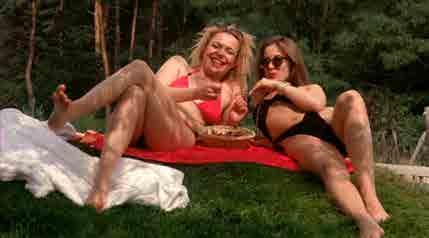
Věra Chytilová — geb. 1929 in Ostrava, gest. 2014 in Prag, (heute) Tschechische Republik. Vertreterin der (tschechischen) „Neuen Welle“ in den 1960er-Jahren. Sie studierte zunächst Philosophie und Architektur, wechselte dann aber zum Film; arbeitete einige Jahre als Regieassistentin und Schauspielerin, bevor sie die erste Studentin an der FAMU wurde, wo sie in Regie graduierte. — born in 1929 in Ostrava, died 2014 in Prague, (today) Czech Republic. Representative of the (Czech) „New Wave“ in the 1960s. She first studied philosophy and architecture, but then switched to film; worked as an assistant director and actress for several years before becoming the first student at FAMU, where she graduated in directing. Filme CEILING (1961) DAISIES (1966) FRUIT OF PARADISE (1969) THE APPLE GAME (1976) PLEASANT MOMENTS (2006)
Bohuš Stejskal führt ein Lotterleben: Im heruntergekommenen, alten Haus seiner Eltern lebt er in den Tag hinein, steigt der Gastwirtin nach und sitzt regelmäßig in ihrer Kneipe. Dort erscheint eines Tages ein Mann mit Anzug und will ihn sprechen. Die Trinkkumpanen halten ihn für einen Geheimpolizisten, er ist jedoch Anwalt und überbringt eine unglaubliche Nachricht: Bohuš hat im großen Stil geerbt und ist jetzt reich. Wie genau Věra Chytilová in ihrem 1992 gedrehten Film dieser Zeit einen Spiegel vorhält, ist erst mit dem Abstand der Jahre sichtbar geworden. Seinerzeit rümpften Filmkritiker und Cineasten eher die Nase über den derben Humor und schämten sich fremd für die einfältigen Helden. Inzwischen hat der Film als pointierte Reflexion der wilden 1990er-Jahre mit ihren ungeahnten, neuen Möglichkeiten und unerwarteten Karriereknicks gerade bei jüngeren Generationen eine Art Kultstatus. 2014 wurde eine Fortsetzung gedreht, die jedoch bei Weitem nicht an das Original heranreicht. CF Bohuš Stejskal leads a dissolute lifestyle: he lives for the moment from the modest surroundings of his parents‘ rundown house, struggles for the innkeeper‘s affections and, to the latter end, regularly hangs around in her pub. One day a man in a suit appears and wants to speak to him. His drinking buddies believe the newcomer is a secret policeman and yet he claims to be a lawyer in possession of an incredible message: Bohuš has inherited big time and is now rich. How accurately Věra Chytilová was able to capture the spirit of an age in this film, shot back in 1992, has only become clear with the benefit of hindsight. Back then film critics and audiences alike were more likely to turn their noses up at the work‘s crude humour and feel a sense of embarrassment when faced with the simple-minded heroes. In the meantime, however, the film has obtained a kind of cult status, especially amongst younger generations, as a pointed reflection of the wild nineties with its previously undreamt-of opportunities, as well as the career highs and lows. In 2014 a sequel was shot, this however didn‘t come close to matching the heights of the original. CF
Filmformat / Format DVD | Farbe / Colour Drehbuch / Script Bolek Polivka Kamera / Photography Ervin Sanders Ton / Sound Zbynek Mikulik Schnitt / Editing Karolina Prusová Musik / Music Jirí Bulis Ausstattung / Set Design Zbynek Hloch Darsteller / Cast Bolek Polívka Produzent / Producer Jiří Ježek Produktion / Production Space Films Kontakt / Contact Space Films Jiří Ježek jjezek@space-films.cz Havlovská 135/36, 160 00 Praha 6 Czech Republic Tel: +420 - 257 535 107 Fax: +420 - 257 535 108
DAS DEUTSCHE KETTENSÄGENMASSAKER DAS DEUTSCHE KETTENSÄGENMASSAKER THE GERMAN CHAINSAW MASSACRE
Sie kamen als Freunde und wurden zu Wurst! Christoph Schlingensiefs zynischer Kommentar auf die deutsche Wiedervereinigung polarisierte bei seiner Uraufführung Publikum und Multiplikatoren. Seine für die Kamera inszenierte Performance über drastische Begegnungen im Zonenrandgebiet machte ihn erstmals einem größeren Publikum bekannt, gleichzeitig kam es zu den erwarteten Anfeindungen. They came as friends and became sausage! Christoph Schlingensief‘s cynical commentary on German reunification polarised audiences and industry multipliers from the moment of its premiere screening. His staged performance on dramatic encounters along the inner-German frontier brought him to the attention of a wider audience, at the same time generating predictably hostile reactions.
Schon im Titel deutlich als Hommage an Tobe Hoopers Horror-Klassiker THE TEXAS CHAINSAW MASSACRE von 1974 angelegt, verbindet das einstündige Werk Motive des Slasher-Genres mit eher performativen Mutmaßungen über deutsch-deutsche Begegnungen im Zonenrandgebiet. Um so schnell wie möglich nach dem Mauerfall an die begehrte Westmark zu kommen, macht sich die junge Clara auf den Weg in den Westen. Dort stößt sie allerdings auf die Mitglieder einer sinisteren Metzgerfamilie, die sehr eigene Vorstellungen von der „Einverleibung“ des Ostens hegt. Mit sichtlicher Freude am Spiel legen die Familienmitglieder nach und nach jegliche Hemmungen ab und steigern sich in einen wahren Kunstblutrausch. Kurz vor dem geplanten Bundesstart im November 1990 zogen mehrere Kinos ihre Zusage zur Aufführung zurück. Zu drastisch erschien diese szenische Improvisation über den ein Jahr zuvor stattgefundenen Mauerfall. Von heute aus gesehen erscheint der Film als ein grotesk-makabres Menetekel. CL
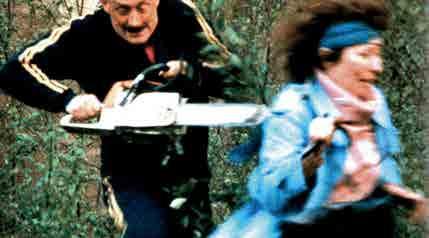
Homage to Tobe Hooper‘s horror classic THE TEXAS CHAINSAW MASSACRE from 1974, as is strongly hinted to in the title, this one-hour work combines motifs from the Slasher genre with more performative speculations on cross-German encounters along the inner-German frontier. To get her hands on the coveted West Mark as soon as possible after the fall of the Berlin Wall young Clara sets off for the West. There, however, she encounters members of a sinister butcher‘s family who have their own ideas about how to implement the “incorporation” of the East. Taking obvious delight in the proceedings the family members gradually shake off any inhibitions and lose themselves in a veritable, if artificial, bloodlust hysteria. Shortly before the scheduled national release in November 1990 several cinemas withdrew their agreement to screen the film. This largely improvised work was considered too extreme at the time, coming only a year after the fall of the wall. From today‘s perspective the film strikes the viewer as a grotesque-macabre foreboding of things to come. CL
Christoph Schlingensief — geb. 1960 in Oberhausen, gest. 2010 in Berlin, Deutschland. (Theater-) Regisseur, Schauspieler, Künstler, Autor. Neben zahlreichen Kurzfilmen drehte und arbeitete er auch fürs Fernsehen, inszenierte Theaterstücke und Opern, war künstlerisch und sozial aktiv. DAS DEUTSCHE KETTENSÄGENMASSAKER ist Teil seiner zwischen 1989 und 1992 entstandenen Deutschlandtrilogie. — born in 1960 in Oberhausen, died 2010 in Berlin, Germany. (Theatre) director, actor, artist, author. In addition to numerous short films, he also shot and worked for television, staged plays and operas, and was artistically and socially active. THE GERMAN CHAINSAW MASSACRE is part of his “Germany trilogy”, which he created between 1989 and 1992. Filme TUNGUSKA – DIE KISTEN SIND DA (1984) MUTTERS MASKE (1988) 100 JAHRE ADOLF HITLER – DIE LETZTE STUNDE IM FÜHRERBUNKER (1989) TERROR 2000 – INTENSIVSTATION DEUTSCHLAND (1992) UNITED TRASH (1995)
Filmformat / Format DCP | Farbe / Colour Drehbuch / Script Christoph Schlingensief Kamera / Photography Christoph Schlingensief, Voxi Bärenklau Ton / Sound Eckhard Kuchenbecker Schnitt / Editing Ariane Traub Musik / Music Jacques Arr Ausstattung / Set Design Uli Hanisch Darsteller / Cast Karina Fallenstein, Susanne Bredehöft, Artur Albrecht, Volker Spengler, Alfred Edel, Brigitte Kausch, Dietrich Kuhlbrodt, Reinald Schnell, Udo Kier, Irm Hermann, Eva Maria Kurz, Ingrid Raguschke, Mike Wiedemann Produzent / Producer Christoph Schlingensief Produktion / Production DEM Filmproduktion, Mühlheim Kontakt / Contact Filmgalerie 451 GmbH & Co. KG Frieder Schlaich Saarbrücker Straße 24 10405 Berlin Germany kino@filmgalerie451.de +49-(0)30-33982800
FORTSCHRITT IM TAL DER AHNUNGSLOSEN FORTSCHRITT IM TAL DER AHNUNGSLOSEN PROGRESS IN THE VALLEY OF THE PEOPLE WHO DON‘T KNOW
Der Südosten Sachsens wurde zu DDR-Zeiten „Tal der Ahnungslosen“ genannt, weil dort kein Westfernsehen empfangen werden konnte. Heute treffen hier syrische Kriegsflüchtlinge auf ehemalige Werksarbeiter des Landmaschinenkombinats „Fortschritt“. Gemeinsam rekonstruieren sie Aspekte der Alltagskultur in der DDR. Pointierte filmische Annäherung an komplexe ostdeutsche Mentalitäten. During the era of the GDR, southeast Saxony was called the ‘Valley of the people who don’t know’ because it had no reception for West German television. Today, this is where Syrian war refugees meet former factory workers of the agricultural machinery combine ‘Fortschritt’ (Progress). Together they reconstruct aspects of everyday culture in the GDR. The film is a trenchant approach to complex East German mentalities.
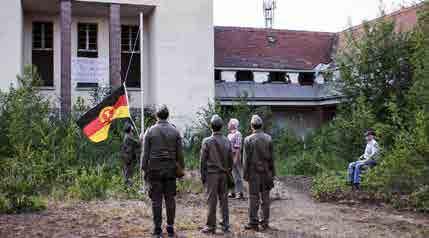
Florian Kunert — geboren 1989 in Sebnitz, heute Deutschland. Er studierte Dokumentarfilmregie an der Escuela Internacional de Cine y TV in Kuba und schloss ein postgraduales Studium an der Kunsthochschule für Medien Köln ab. FORTSCHRITT IM TAL DER AHNUNGSLOSEN ist sein Langfilmdebüt und feierte auf der diesjährigen Berlinale Weltpremiere. — born in 1989 in Sebnitz, today Germany. He studied documentary film directing at the Escuela Internacional de Cine y TV in Cuba and completed postgraduate studies at the Academy of Media Arts in Cologne. PROGRESS IN THE VALLEY OF THE PEOPLE WHO DON’T KNOW is his full-length debut which celebrated its world premiere at this year‘s Berlinale. Filme OH BROTHER OCTOPUS (2017, doc, short)
Die Landmaschinen aus Neustadt in Sachsen wurden auch nach Syrien verkauft. Manche der Arbeiter aus dem Kombinat „Fortschritt“ waren sogar dort. Die Ankunft der syrischen Flüchtlinge löst bei einigen daher nostalgische Gefühle aus, bei den Betreiberinnen des Heimatmuseums etwa oder den Teilnehmern des Gesangvereins. Als Teil der filmischen Inszenierung werden die Geflüchteten in längst verflossene Bräuche der DDR-Alltagskultur eingeführt: Zum Beispiel wie man als junger Pionier den Lehrer grüßte. Regisseur Florian Kunert, der selbst in der sächsischen Schweiz aufgewachsen ist, entführt mit seinem experimentellen Dokumentarfilm in ein komplexes Mentalitätsgeflecht aus Erinnerung und Enttäuschung, Beharrungsvermögen, Gastfreundschaft. Er liefert damit einen wichtigen Beitrag zur Erkundung ostdeutscher Befindlichkeiten in einer Region, die ansonsten vor allem mit ihren populistischen Ressentiments in die Schlagzeilen gerät. „Kunerts Arbeit als Regisseur ähnelt der eines Therapeuten, der sich um der komplizierten Gegenwart willen mit der Vergangenheit beschäftigt, die sich nicht so einfach nacherzählen lässt.“ (Dorothee Wenner, Katalogtext für das Berlinale-Forum 2019) WMH The agricultural machinery made in Neustadt in Saxony was also sold to Syria. Some of the ‘Fortschritt’ combine workers had even travelled there. So, the arrival of the Syrian refugees triggers nostalgic sentiments in some of them, for example, in the people who run the museum of local history and the choral society members. As part of the mise-en-scène, the refugees are inducted into long bygone traditions of East German everyday culture: for instance, how to greet the teacher as a young pioneer. With his experimental documentary, director Florian Kunert, who himself grew up in Saxon Switzerland, carries his audience off into a complex mentality web of memories and disappointment, perseverance and hospitality. In doing so, he makes an important contribution to the exploration of East German sensitivities in a region that otherwise makes headlines mainly with its populist resentments. “Kunert’s work as a director resembles that of a therapist who, for the sake of the complicated present, investigates the past, which is challenging to recount.” (Dorothee Wenner, catalogue text for the Berlinale Forum 2019) WMH
Filmformat / Format DCP | doc. | Farbe / Colour Drehbuch / Script Florian Kunert Kamera / Photography Joanna Piechotta Ton / Sound Christian Bläsche, Stefan Voglsinger Schnitt / Editing Ian Purnell, Florian Kunert Musik / Music Stefan Galler, Franziska Henke Produzent / Producer Stefan Gieren Produktion / Production StoryBay Cinema Co-Produktion / Co-Production Kunsthochschule für Medien Köln Kontakt / Contact StoryBay Cinema Stefan Gieren stefan@storybay.tv +4917632538526 Neuperver Str. 18, 29410 Salzwedel Germany
MEČIAR DIE GIER NACH MACHT THE LUST FOR POWER
TEREZA NVOTOVÁ / SLOWAKEI, TSCHECHISCHE REPUBLIK / SLOVAKIA, CZECH REPUBLIC, 2017, 89 MIN
Was waren das für verrückte Zeiten, als die slowakischen Kinder nicht nur Winnetou und E.T., sondern auch Mečiar spielten? Und wer war dieser Vladimír Mečiar, über den die heutigen jungen Menschen nur achselzuckend die Nase rümpfen? DIE GIER NACH MACHT ist ein dokumentarisches Politikerporträt aus überraschender Perspektive. Times indeed were wild when Slovak children pretended not only to be Winnetou and E.T. but also Mečiar. And yet who was this Vladimír Mečiar, mention of whom provokes nothing but shoulder-shrugging and a turning up of noses amongst the youth of today? THE LUST FOR POWER is a documentary portrait of a politician captured from a surprising perspective.
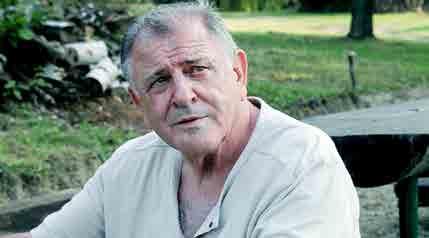
Tereza Nvotová — geboren 1988 in Trnava, heute Slowakei. Derzeit lebt sie in Prag, wo sie an der FAMU Regie studierte. Sie realisierte bereits mehrere Dokumentarfilme, u.a. in Kooperation mit HBO-Europe. 2017 feierte sie ihr Spielfilmdebüt. Sie ist außerdem als Drehbuchautorin und Schauspielerin tätig. Beim 28. FFC war sie in Benjamin Tučeks MÜLL AUF DEM MARS zu sehen. — born in 1988 in Trnava, today Slovakia. She currently lives in Prague, where she studied directing at the FAMU. She has already made several documentary films, among others in cooperation with HBO-Europe. She made her feature film debut in 2017. She also works as a scriptwriter and actress. At the 28th FFC she could be seen in Benjamin Tuček’s TRASH ON MARS. Filme ARTIFICIAL INSIGHT (2009, doc, short) TAKE IT JEASY (2009, doc) PLAYERS (2010, moc) A YEAR WITH FULLBRIGHT (2014, doc, TV series) FILTHY (2017)
Die Wende von 1989 brachte nicht nur Dissidenten in die Politik, sondern auch Unbekannte. Einer von ihnen, Vladimír Mečiar, war zuvor Anwalt in einem sozialistischen Staatsbetrieb, gründete dann eine Partei und hatte genug Charisma, um vielen Menschen als Hoffnungsträger zu gelten. Sein Name wurde zum Synonym für die wilden 1990er-Jahre, als die alte Ordnung gestürzt und eine neue noch nicht etabliert war. Der Geist des mächtigen Mečiar schwebte gespenstergleich auch über der Kindheit der 1988 geborenen Tereza Nvotová, der Regisseurin des Films. Er beherrschte die Nachrichtensendungen, sein Bild hing in ihrem Klassenzimmer, er brachte Streit in Familien und Freundeskreise – und die Gesellschaft schließlich dazu, sich zu politisieren und ihn abzuwählen. Das Phänomen Mečiar beschäftigt die Filmemacherin bis heute. Sie interviewt den Politikpensionär in seiner protzigen Villa und rekonstruiert Aufstieg, Affären und Fall des Populisten mithilfe von Archivaufnahmen. Zeitgleich entstandene Privatvideos aus ihrer Familie ergänzen den Film. CF The revolution of 1989 saw not only dissidents but also complete unknowns enter politics. One of the latter, Vladimír Mečiar, was employed as a lawyer for a state-owned enterprise when he resolved to start a political party of his own, possessing as he did sufficient charisma to be regarded by many as a bearer of hope. Subsequently his name would go down as synonymous with the wild nineties, a time when the old regime had been brought down and a replacement was yet to be found. The spirit of the all-powerful Mečiar also hung like a spectre throughout director Tereza Nvotová‘s childhood, born as she was in 1988. He dominated the news, his image was on the wall of her classroom, he was the cause of disputes among family and friends, and ultimately created a politicised general public that voted him out of office. The Mečiar phenomenon remains present in the director‘s thoughts to the present day: she interviews the retired politician in his opulent villa and reconstructs his rise and fall, as well as the scandals that accompanied him, with the help of archive footage, as well as photos from her family‘s private archive. CF
Filmformat / Format DCP | doc. | Farbe / Colour Drehbuch / Script Tereza Nvotová, Josef Kraibich Kamera / Photography Martin Žiaran Ton / Sound Igor Baar, Radim Hladík Jr. Schnitt / Editing Josef Kraibich Musik / Music Jonatan Pastircak (Pjoni) Produzent / Producer Zuzana Mistríková, Ľubica Orechovská Produktion / Production PubRes, Zuzana Mistríková, mistrikova@pubres. sk, Grosslingova 63, 811 09 Bratislava, Slovakia, Tel: +421252634203, Mobile: +421908777540 Co-Produktion / Co-Production Negativ / HBO Europe Kontakt / Contact Negativ Daniel Vadocký Ostrovní 30 110 00 Praha daniel@negativ.cz +420 777 697 543
RUNDE TISCHE – DIE GREMIEN DER FRIEDLICHEN REVOLUTION RUNDE TISCHE – DIE GREMIEN DER FRIEDLICHEN REVOLUTION EAST GERMAN ROUND TABLES – COMMITTEES OF THE PEACEFUL REVOLUTION
Rückschau auf ein einzigartiges politisches Experiment: Die Geschichte der sogenannten Runden Tische aus der Sicht der damals beteiligten Akteure. Bürgerrechtler, Politiker, Theologen, Oppositionelle berichten von ihren Intentionen, ihrer Arbeit, ihren Ideen, Erfolgen und Niederlagen, werten ihre Erfahrungen aus heutigem Blickwinkel aus. Looking back at a unique political experiment: the history of the so-called Round Tables from the viewpoint of the then involved players. Civil rights activists, politicians, theologians, opposition members talk about their intentions, their work, ideas, successes and defeats, evaluate their experiences from a present-day perspective.
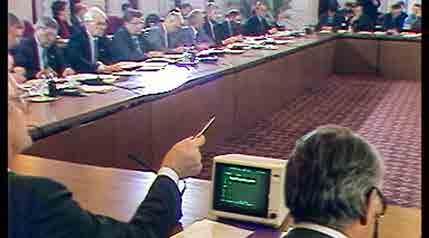
Michael Erler — Autor, Regisseur, Produzent. Er studierte an der (damaligen) Hochschule für Film und Fernsehen Potsdam-Babelsberg Regie. Seit 1990 arbeitet er freischaffend und hat eine Vielzahl von Dokumentationen und Reportagen für das Öffentlich-Rechtliche Fernsehen realisiert. Seine Schwerpunkte sind vor allem historische und ostdeutsche Themen. — writer, director, producer. He studied directing at the (former) Academy for Film and Television Potsdam-Babelsberg. Since 1990 he has been working freelance and has produced numerous documentaries and reports for public television. His main focus is on historical and East German topics. Filme DIE WETTINER (1980, doc) ROTE TRAUMSCHIFFE (1993, doc) 100 JAHRE FRIEDENSAU (2000, doc, short) GENIE UND WAHNSINN (2007, doc) DER OSTEN (2011-2017, doc, TV series)
Zunächst in Polen, wurden die Runden Tische eingerichtet, um den gesellschaftlichen Übergang mit all seinen Konflikten und Visionen nach dem Zusammenbruch des Sozialismus zu moderieren. Dabei kamen Vertreter der Regierung, der Opposition, staatlicher Institutionen und anderer gesellschaftlicher Gruppen zusammen, um Ideen für die weitere Gestaltung der Politik zu entwickeln. Der Film folgt der Zeitachse der damaligen Ereignisse in der DDR, in ihrer unmittelbaren Dynamik vom September 1989 bis Ende März 1990. Mit zeitgeschichtlichem Material, Fotos und Dokumentarfilmaufnahmen werden die Ereignisse der friedlichen Revolution nacherlebbar. Zu Wort kommen 30 Protagonisten, die selbst mit am Runden Tisch saßen – von Matthias Platzeck über Lothar de Maizière, den Filmemacher Konrad Weiß bis zu Gerd Poppe und Sylvia Kabus. Nicht nur ein Zeitdokument, sondern auch eine Einladung zur Neu- und Wiederentdeckung einer politischen Kultur, die einen bis dahin nicht gekannten Dialog auf Augenhöhe als zentrales Mittel der Gestaltung einsetzte. BB Starting in Poland, the Round Tables were established after the collapse of socialism to facilitate social transition with all its conflicts and visions. Representatives of the government, the opposition, state institutions and other social groups gathered to develop ideas for the further development of politics. The film follows the chronology of events in the GDR at that time, focusing on their immediate dynamic from September 1989 to the end of March 1990. The events of this peaceful revolution are brought to life by way of contemporary material, photographs and documentary footage. 30 protagonists who sat at these Round Tables themselves get to speak, ranging from Matthias Platzeck, Lothar de Maizière and film maker Konrad Weiß, to Gerd Poppe and Sylvia Kabus. This is not only a contemporary document, but also an invitation to rediscover and newly discover a political culture that used a previously unheard dialogue at eye level as a key development instrument. BB
Drehbuch / Script Michael Erler Kamera / Photography Bernadette Paassen, Stefan Wachner, Markus Janssen Ton / Sound Daniel Liepke, Michael Arras, Clemens Böcking Schnitt / Editing Steffen Werner Produzent / Producer Olaf Jacobs Produktion / Production Hoferichter & Jacobs Film- und Fernsehproduktionsgesellschaft mbH Kontakt / Contact Hoferichter & Jacobs Film- und Fernsehproduktionsgesellschaft mbH Kantstraße 43 Leipzig, 04275 Olaf Jacobs info@hoferichterjacobs.de +49(0)341/2413850
VATERLAND VATERLAND FATHERLAND
Odyssee eines einstigen, aus Algerien stammenden Vertragsarbeiters in der DDR, der seinen Sohn entführt und sich mit ihm auf eine ziellose Reise begibt. Die von den Beiden durchquerten apokalyptischen Szenerien erweisen sich als innere Landschaften, bewohnt von wenigen Menschen, meist so schweigsam wie der tragische Held selbst. The odyssey of a former Algerian contract worker in the GDR who, having kidnapped his son, sets off on an aimless journey. The apocalyptic landscapes crossed by the two prove to be inner landscapes, inhabited by few people, as silent as the tragic hero himself.
Nach dem Ende der DDR findet sich Kadir völlig entwurzelt wieder. Einst als algerischer Vertragsarbeiter im Osten Deutschlands gestrandet, verbringt er zwei Jahre in einer psychiatrischen Anstalt. Nach seiner Entlassung erfährt er, dass seine deutsche Frau die Scheidung eingereicht hat und ihm jeden Kontakt zum gemeinsamen Kind untersagt. Spontan entführt er den Zweijährigen und begibt sich mit ihm auf eine Reise gen Süden, die dennoch ziellos bleibt. Die Schauplätze, mit denen er seinen Sohn und sich selbst konfrontiert, sind innere Landschaften, bestehend aus apokalyptischen Szenerien und verunsicherten, wortkargen Menschen. Mit seinem Spielfilmdebüt gelingt Uli M. Schueppel die Verbindung konkreter historischer Vorgänge mit archetypischen Figuren und universellen Situationen. Verstärkt wird die beklemmende Grundstimmung durch die präzise Kameraarbeit von Ciro Cappellari und die an Assoziationen reiche Musik von Mick Harvey (Nick Cave & The Bad Seeds) und Alexander Hacke (Einstürzende Neubauten). „Filme, die alles aussprechen, sind nicht meine Sache. VATERLAND bietet keine Lösung an. VATERLAND ist ein Aufschrei.“, so der Regisseur selber. CL
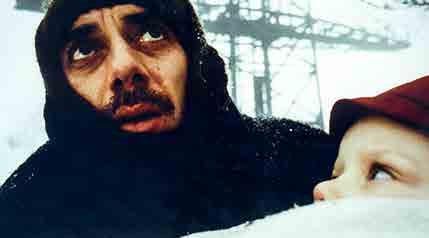
After the dissolution of the GDR Kadir finds himself once again completely uprooted. Having spent the recent past stranded as an Algerian contract worker in East Germany, he is subsequently confined in a mental hospital for the following two years. Upon his release he learns that his German wife has filed for divorce and refuses to allow him to have any contact with their child. On the spur of the moment he abducts the two-year-old and sets off with him on a journey to the south, a journey which ultimately remains aimless. The locations with which he finds himself and his son confronted prove to be inner landscapes consisting of apocalyptic settings and unsettled, taciturn people. With his feature film debut Uli M. Schueppel succeeds in combining concrete historical processes with archetypal figures and universal situations. The oppressive mood is enhanced by the rigorous camerawork of Ciro Cappellari and the association-rich soundtrack from Mick Harvey (Nick Cave & The Bad Seeds) and Alexander Hacke (Einstürzende Neubauten). In the words of the director „films that say everything are not my thing. FATHERLAND offers no solution. FATHERLAND is an outcry.“ CL
Uli M Schueppel — geboren 1958 in Erbach, heute Deutschland. Er studierte Regie an der DFF Berlin, wo er heute auch lehrt. Zahlreiche Kurz-, Spiel- und Dokumentarfilme sowie Musikvideos und Videoinstallationen sind unter seiner Regie entstanden. Letztere werden weltweit auf bekannten Ausstellungen präsentiert. Für seine Filme wurde er mehrfach ausgezeichnet. Musik spielt in seinen Arbeiten eine wichtige Rolle. — born in 1958 in Erbach, today Germany. He studied directing at the DFF Berlin, where he also teaches today. He has directed numerous short films, feature films, documentaries, music videos and video installations. The latter are presented at well-known exhibitions around the world. He has received several awards for his films. Music plays an important role in his work. Filme THE ROAD TO GOD KNOWS WHERE (1990, doc) PLANET ALEX (2000) BERLIN SONG (2007, doc) ELEKTROKOHLE (VON WEGEN) (2009, doc) DER ATEM (2019, doc)
Filmformat / Format PRO RE | Farbe / Colour Drehbuch / Script Uli M Schueppel Kamera / Photography Ciro Cappellari Ton / Sound Jörg Bohlmann Schnitt / Editing Inge Schneider Musik / Music Mick Harvey, Alexander Hacke Ausstattung / Set Design Susan Turcot Darsteller / Cast Olivier Picot, Heide Bartolomäus, Christin König, Miroslav Baka, Alexander Hacke Produzent / Producer A. Kitzler & U. Schueppel Produktion / Production Schueppel-Films Kontakt / Contact Schueppel-Films Husemannstr. 33 10435 Berlin Germany info@schueppel-films.de Uli M Schueppel +49 179 2905958
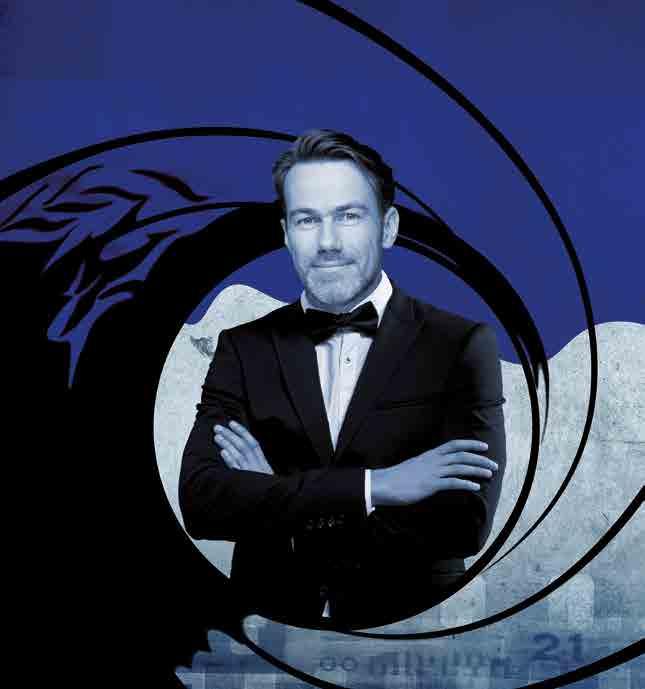
WIR MACHEN KINO ZUM EREIGNIS!
Seit 20 Jahren verleihen und installieren wir digitale HighEnd-Projektionstechnik, Soundequipment, vollautomatische Vorführsteuerung und individuelle Lösungen für alle großen und kleinen Veranstaltungsorte sowie Open-Air-Events. 0341-90221580 . www.big-cinema.de








